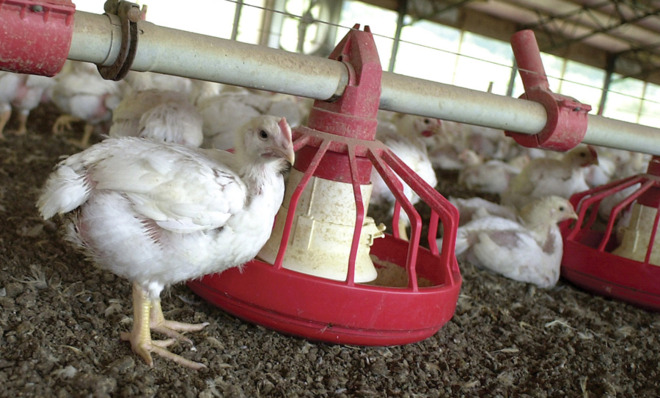Why the FDA's new antibiotic rules fall short
Good news for superbugs

A free daily email with the biggest news stories of the day – and the best features from TheWeek.com
You are now subscribed
Your newsletter sign-up was successful
On Wednesday, the Food and Drug Administration finalized a set of rules it says will restrict the sweeping use of antibiotics at factory farms, a practice experts say has helped create drug-resistant "superbugs." Critics are calling the move too little too late.
The agency now recommends that animal drug manufacturers voluntarily change the labels on their antibiotics so that factory farms can only buy them to treat sickness, rather than promote growth. Farmers can now buy antibiotics over the counter and add it to livestock food and water, but the FDA hopes the new guidance will curb this practice, requiring farmers to get a prescription and only use the drugs with veterinarian oversight. The animal drug companies will have 90 days to accept or reject the FDA's changes, then three years to implement them.
The FDA argues that making the rules voluntary will actually speed up the process. "It avoids legalistic, product-by-product regulatory proceedings that would take years to complete," Michael Taylor, the FDA's top food safety chief told reporters Wednesday.
The Week
Escape your echo chamber. Get the facts behind the news, plus analysis from multiple perspectives.

Sign up for The Week's Free Newsletters
From our morning news briefing to a weekly Good News Newsletter, get the best of The Week delivered directly to your inbox.
From our morning news briefing to a weekly Good News Newsletter, get the best of The Week delivered directly to your inbox.
Critics, however, are not so enthusiastic about the "voluntary" element. It leaves the U.S. behind European nations and Canada, which have banned antibiotics in sub-therapeutic doses in animals. Another concern is that even if a drug company changes its labels, a factory farm may still be able to use antibiotics to prevent sickness, as long as it had veterinarian oversight. This means farmers could "continue to use the drugs to compensate for cramped and unsanitary living conditions that can foster disease in animals," says The Washington Post. Critics see this as a worrisome loophole.
The change comes after decades of criticisms over how factory farms use antibiotics. Some 50 years ago, farmers realized that if they fed livestock "sub-therapeutic" doses of antibiotics, animals would gain as much as three percent more weight than they would otherwise — letting farmers ramp up production for minimal cost. As a result, an estimated 15 to 17 million pounds of antibiotics are now used sub-therapeutically in the U.S. Though it's still mysterious why the weight gain occurs, some evidence indicates that "antibiotics kill the flora that would normally thrive in the animals' intestines, thereby allowing the animals to utilize their food more effectively," says PBS.
Meanwhile, it is also helping to create antibiotic-resistant superbugs that "sicken and kill thousands of Americans each year," says The Washington Post.
Earlier this year, the Centers for Disease Control and Prevention reported that each year in the U.S., "at least two million people become infected with bacteria that are resistant to antibiotics and at least 23,000 people die each year as a direct result of these infections." In addition, "Many more people die from other conditions that were complicated by an antibiotic-resistant infection." Of use in animals, the agency had this to say:
A free daily email with the biggest news stories of the day – and the best features from TheWeek.com
Resistant bacteria can contaminate the foods that come from those animals, and people who consume these foods can develop antibiotic-resistant infections. Antibiotics must be used judiciously in humans and animals because both uses contribute to not only the emergence, but also the persistence and spread of antibiotic-resistant bacteria. [CDC]
It's easy to see why public health experts are not exactly gleeful over the FDA's announcement. The Washington Post reports some of the reactions:
Rep. Louise M. Slaughter (D-N.Y.), a microbiologist who has unsuccessfully tried to pass legislation limiting the use of certain antibiotics to humans and sick animals, called the agency's efforts "an inadequate response" that "falls woefully short of what is needed to address a public health crisis." [The Washington Post]
Carmel Lobello is the business editor at TheWeek.com. Previously, she was an editor at DeathandTaxesMag.com.
-
 ‘Restaurateurs have become millionaires’
‘Restaurateurs have become millionaires’Instant Opinion Opinion, comment and editorials of the day
-
 Earth is rapidly approaching a ‘hothouse’ trajectory of warming
Earth is rapidly approaching a ‘hothouse’ trajectory of warmingThe explainer It may become impossible to fix
-
 Health insurance: Premiums soar as ACA subsidies end
Health insurance: Premiums soar as ACA subsidies endFeature 1.4 million people have dropped coverage